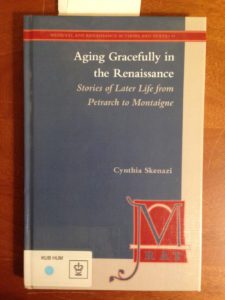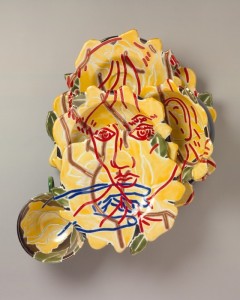 Under this heading I will reflect on what it means to age gracefully.
Under this heading I will reflect on what it means to age gracefully.
I will analyse the ideas of ‘grace’ and ‘wisdom’ in a secular context, and contrast the notion of ‘graceful ageing’ with related notions, like ‘successful ageing’ and ‘healthy ageing’.
 Cynthia Skenazi’s book Aging Gracefully in the Renaissance (2013) is an important source of inspiration for my attempt to conceptualize ‘graceful ageing’ vs. ‘successful ageing’, ‘healthy ageing’ etc. further.
Cynthia Skenazi’s book Aging Gracefully in the Renaissance (2013) is an important source of inspiration for my attempt to conceptualize ‘graceful ageing’ vs. ‘successful ageing’, ‘healthy ageing’ etc. further.
My preliminary position is that the contemporary discourse about ‘good’ ageing — both in research, in policy, and in media — is biased. There is too much emphasis on the medical and health aspects of ageing, and not enough attention on the aesthetic and spiritual (still in a secular sense) dimensions of growing old.
After having analysed these different understandings of ‘good’ ageing, I will discuss how different autobiographical practices might contribute to a good senior life.
Succesful ageing
In a paper titled “Successful ageing: a historical overview and critical analysis of a successful concept” (Journal of Aging Studies, vol. 31, 139–149, 2014; pdf here), Morten Bülow and I analyzed the notion of ‘successful ageing’.
Care of self
Paul Mathieu, ‘Souci de soi’ (1954). In the Los Angeles County Museum of Art (http://collections.lacma.org/node/176418)
On this page (and subpages) I will also discuss autobiography as ‘care of self’, and as a kind of personal self-therapy.
‘Care of self’ is an ambiguous concept. It is mostly (and unreflectedly) used in a mundane nursing and health care context (self care).
Among philosophers and in cultural studies, the concept of ‘care of self’ has been discussed more systematically, mainly inspired by the late works of Michel Foucault (‘souci de soi’).
I will discuss how different autobiographical practices could be understood in terms of ‘care of self’, both in the mundane and the philosophical sense.
Socratic therapy
There are literally hundreds of different kinds of therapies on the market and in the literature: psychoanalytic therapies, body therapies, cognitive therapies, and so forth. In this particular context, I will focus on a kind of cognitive therapy called ‘socratic therapy‘.
The idea of philosophy as ‘socratic therapy’ has been systematically investigated by historian of ideas Pierre Hadot, e.g. in Exercices spirituels et philosophie antique (1981); transl.: Philosophy as a way of fife, 1995).
I will try develop a corresponding argument for autobiography as a socratic therapeutic method.

